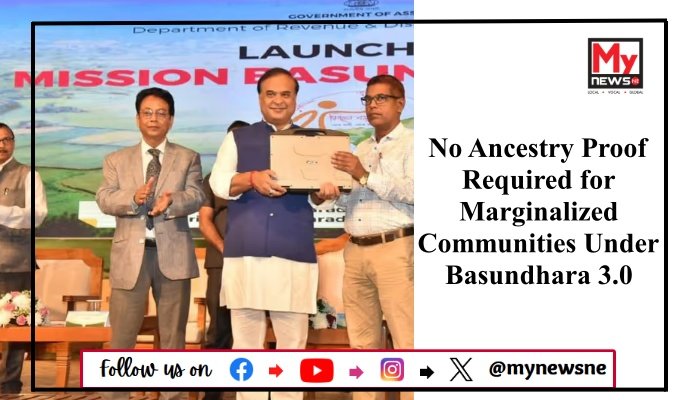Assam’s Basundhara 3.0: Simplified Land Rights for SC, ST, Adivasi, Tea Tribes, and Gorkhas
Guwahati – Assam Chief Minister Himanta Biswa Sarma officially launched Mission Basundhara 3.0 at the Srimanta Sankardeva Kalakshetra on Sunday, aiming to improve land ownership rights for indigenous communities in the state. This ambitious initiative comes amid criticism from opposition parties, including the Congress and the All India United Democratic Front (AIUDF), who have raised concerns about its implications. In response to the backlash, CM Sarma emphasized that Mission Basundhara is specifically tailored to address the long-standing issue of land rights for indigenous people, ensuring that their claims are recognized and secured.
One of the key features of Mission Basundhara 3.0 is the expansion of land rights. The initiative will exempt indigenous groups such as Scheduled Castes (SC), Scheduled Tribes (ST), Adivasis, Tea Tribes, and Gorkhas from needing to prove three generations of ancestry for land claims, thereby recognizing them as “sons of the soil.” Additionally, pre-1971 refugee certificate holders will also be eligible for land rights, further broadening the scope of beneficiaries.
The initiative also aims to make land acquisition more affordable by reducing premium rates in urban areas to 3% of the zonal valuation. This measure is expected to ease the financial burden on city dwellers seeking to settle land. Furthermore, Mission Basundhara 3.0 includes provisions for the reconsideration of rejected applications, allowing for policy adjustments that will enable previously denied applications under Basundhara 2.0 to be reviewed.
To enhance efficiency, the government plans to digitize the entire land settlement process, moving from annual leases to periodic leases in urban areas at reasonable premium rates. This transition aims to streamline land administration and reduce bureaucratic delays. Moreover, small landholders will have special provisions to regularize the use of tea grant land for non-tea purposes, subject to premium payments, with legal measures to penalize unauthorized land use implemented after the mission concludes.
Another significant aspect of Mission Basundhara 3.0 is the review of religious institution lands. Land acquired from religious institutions will be evaluated to facilitate the settlement of landless indigenous people in accordance with existing statutory provisions. Additionally, the government will introduce a geospatial mapping service to provide accurate maps of land parcels, improving the clarity of property boundaries and land records.
Lastly, the initiative includes a mission-mode revenue campaign to collect outstanding land revenue, linking zonal land prices to revenue collection in urban areas. Efforts will also be made to purify land records by deleting outdated entries and cleaning up land records based on consensual division applications under Section 116 of the Assam Land Revenue Policy.
Through Mission Basundhara 3.0, the Assam government aims to streamline land ownership processes for priority groups while improving transparency in land-related services. This initiative represents a significant overhaul of the state’s land policies, tackling complex issues such as land rights, settlement procedures, and revenue collection with a comprehensive approach.
Read More: Congress PCC President Urges Caution Over Candidate Speculations for Assam By-Elections

